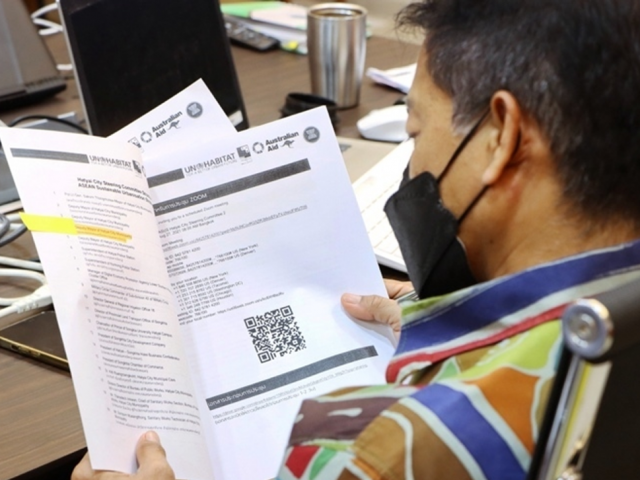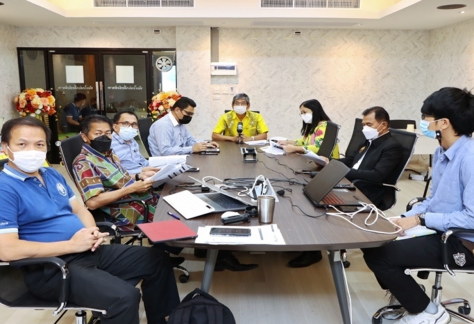Asia
ASEAN Cities Gear Up Towards Sustainable and Inclusive Urban Development
Over half of the ASEAN region’s population resides in urban areas. This shift towards city living, is synonymous with prospects of prosperity and connectivity. It offers the potential for an improved quality of life but also casts significant shadows. Rapid urban growth brings with it a tapestry of challenges: congested streets, air thick with pollution, the slow fade of green spaces, and widening gaps of inequality. These hurdles mark the complex journey of the region’s cities as they expand into the future [2].

A participant of ASUS Project Steering Committee Meeting in Hat Yai. Credit: UN-Habitat ROAP.
The urgent need for ASEAN cities to adopt sustainable urban development solutions was addressed through the “Accelerating the Implementation of the ASEAN Sustainable Urbanisation Strategy (ASUS)” project. During its implementation period, eight ASEAN cities – Kep (Cambodia), Tomohon (Indonesia), Kaysone (Lao PDR), Shah Alam (Malaysia), Mandalay (Myanmar), General Santos (Philippines), Hat Yai (Thailand), and Sa Pa (Viet Nam) – pioneered the implementation of ASUS to drive sustainable and inclusive development to address challenges of today’s growing urban areas. They were engaged through technical and strategic assistance to develop City Technical Proposals (CTPs) as a part of the project.
Focusing on quality environment, Kep City and Mandalay targeted solid waste management systems. Meanwhile, Kaysone, General Santos, and Sa Pa concentrated their CTPs on sustainable transport plans and projects within the Built Infrastructure area. Lastly, Tomohon, Shah Alam, and Hat Yai addressed urban security, proposing digital solutions to enhance citizen safety.
The CTPs development process has been met with enthusiasm across pilot cities from ASEAN countries, who recognised the transformative potential of sustainable urbanization.
As captured by the thorough ASUS Project evaluation study [3], city officials confirmed the CTPs development strongly aligned with the city’s development agenda.
A city official from General Santos, the Philippines, shared the relevance of CTP development to their city, aligning to national regulations and opportunities. “The CTP is aligned to the national goal of promoting Low Carbon Transport also aligned to the Electric Vehicle Industry Development Act (EVIDA) and the Public Utility Vehicle Modernization Program (PUVMP) of the Department of Transportation.”
The CTP has helped cities build optimism and hope for a better quality of life for the citizens. Tomohon city, which CTP focuses on a Digital Solution Strategy to Enhance Safety and Security, plans to improve its disaster early warning system using a digital platform. Natural disasters have been widely known as one of the significant threats to sustainable urban. Given Indonesia’s high seismic activity, Tomohon is no exception. This digital advancement is crucial for ensuring the well-being and safety of the local communities.
In addition, the tourism sector will also benefit from the digital early warning system. “This is the main quality of life issue for our citizens, and portraying Tomohon as a safe destination will also help to allay tourists’ fears. We have tour operators who often question whether we are prepared for disasters and whether their tourists will be safe,” said Jean D’Arc F. Karundeng, a Tomohon city official who is actively involved in the CTP development, as reported in the UN website [4]. She expressed her hope for her city’s overall sustainable development supported through the ASUS project.
The ASUS Project has also inspired her to exchange ideas with other cities participating in the project. “We saw the kind of projects other cities are working on, which gave us ideas for future work, as well as a network of peers to discuss various development issues with,” she added.
The CTPs have also identified funding needs, technical requirements, and work plans to ensure successful implementation and provided cities with solid proposals to seek the necessary funding to implement the plans outlined in their proposals. The city of Hat Yai has successfully adopted the CTP to leverage national funding opportunities and confirmed funding from a national government agency.
Crafting Sustainable Futures: The Strategic Role of City Technical Proposals
The inclusive engagement of local government officials and key city stakeholders ensured that the CTPs were tailored to address specific local needs, under expert guidance provided by the project for each city. The development of the CTPs, structured according to the ASUS Framework and its Toolkits, are aligned with the Sustainable Development Goals (SDGs) and the New Urban Agenda (NUA).
The ASUS Project provided a comprehensive technical approach for each CTP’s development stage, from the City Diagnostic stage to the finalisation and validation of the CTPs, resulting in a beneficial integration of technical proficiency and community aspirations.
Among the six sustainable urban development priority areas in ASUS framework for sustainable development, the CTPs from the eight participating cities prioritised three key areas: Quality Environment, Built Infrastructure, and Security.

ASUS Project Steering Committee Meeting in Hat Yai, with the city officials, during the CTP development process – August 2021-Credit: UN Habitat – ROAP
Sustaining the Momentum – Way Forward
Beyond the local-level initiatives, the ASUS Project supported a greater outreach of the ASUS framework and ASEAN cities efforts through regional-level knowledge-sharing and advocacy initiatives. The ASUS Project helped organise the first ASEAN Sustainable Urbanisation Forum (ASUF) in 2021, held online with over 1,400 registered participants from ASEAN cities, AMS governments, community organisations, international institutions, development banks and the private sector. The development of the CTPs and ASUF was captured in the ASEAN Sustainable Urbanisation Report, which builds on ASUS findings and structure and shares best practices and recommendations to advance sustainable urbanisation in the region in alignment with the SDGs and NUA.
The ASUS Project marked significant progress in implementing ASUS Framework among ASEAN cities through integrated initiatives at the local and regional levels. The project will continue its Phase 2 implementation with further technical assistance and consultancy to support more cities in ASEAN in developing CTPs and advance toward an inclusive and sustainable urban future.
Other Articles
Share This On
Share on facebook
Share on twitter
Share on linkedin
Share on whatsapp
Share on google
[1] Quoted from ASEAN Sustainable Urbanisation Forum report
[2] Adopted from ASEAN Sustainable Urbanisation Report: Sustainable Cities toward 2025 and Beyond (2022)
[3] Source: Sulawesi City Invests in Disaster Warning System with Support from UN-Habitat and the ASEAN Secretariat
[4] Source: Final Evaluation of the Project “Accelerating the Implementation of the ASEAN Sustainable Urbanisation Strategy”
The post ASEAN Cities Gear Up Towards Sustainable and Inclusive Urban Development appeared first on ASEAN Main Portal.

Useful Links

How to Play Online Roulette on a Budget Without Sacrificing Fun in Malaysia

Aki Seiuli: Dragons bring back Samoa prop as injury cover


